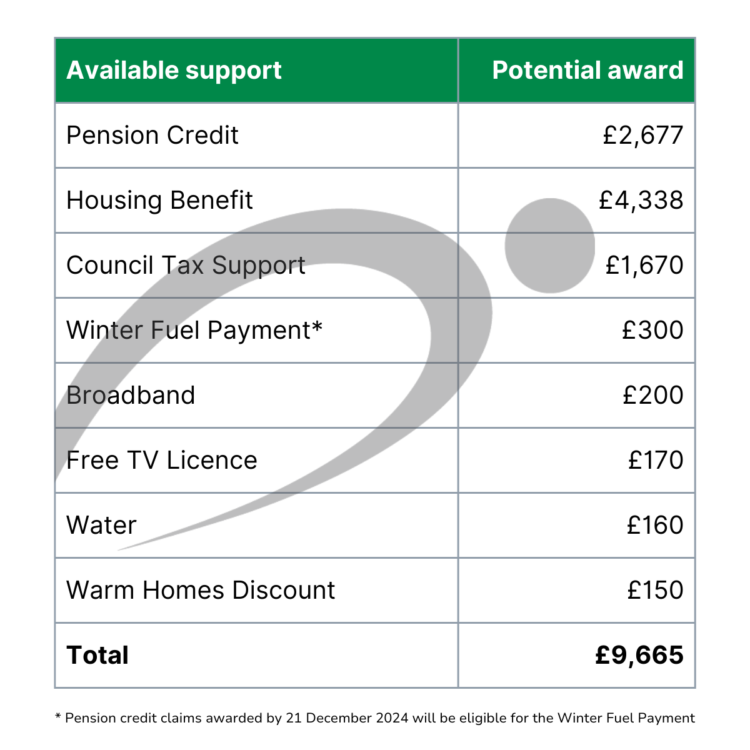Could changes to the Winter Fuel Payment be the boost Pension Credit claimants need?

For one of their first major policy announcements, the new government is making major changes to Winter Fuel Payments, specifically taking it from a universal benefit to a means tested one.
Worth between £200 and £300, Winter Fuel Payments will now be linked to claims for Pension Credit, ring fencing support to lower income pensioners and saving the Treasury around £1 billion a year.
This change means pensioners currently claiming Pension Credit will continue to receive support towards their energy costs this winter. But what about the 880,000 pensioners eligible for Pension Credit who are missing out by not claiming?
As the DWP launches its own Pension Credit take up campaign, we take a look at how we can boost take up using targeted, data-led campaigns with claim rates three times higher than awareness raising alone.
More than 850,000 eligible pensioners are missing out on Pension Credit
In April this year our analysis on unclaimed benefits found £2.1 billion a year in unclaimed Pension Credit. Currently claimed by 1.4 million pensioners, Pension Credit is worth an average of £3,960 a year. But that’s just the start.
If they rent their home and are liable for Council Tax, people claiming Pension Credit can go on to claim up to £12,000 in passported support and associated social tariffs; income that supports not only the ability to pay bills, but the resources needed to live a less financially stressful life, and socialise to combat loneliness.

For pensioners missing out, there is support available and harnessing the power of benefits administrative data is one way local authorities can do more. Visit our unclaimed Pension Credit page to see how much is unclaimed in your area.
Our work with councils demonstrates that proactive, locally-led, data-first campaigns are three times as effective as national campaigns. And as our campaigns are not speculative, we identify eligibility using administrative data, a typical campaign returns a more than 30% increase in Pension Credit take up each time, funding no local authority can afford to forgo for their low income older residents.
Working with the Greater London Authority and 27 London Boroughs, we have transformed the Pension Credit landscape in London, delivering more than £10 million a year in additional Pension Credit to thousands of low income Londoners with more campaigns underway. And now, these pensioners will get Winter Fuel Payments But what about those who won’t?
130,000 pensioners miss out on Pension Credit by £500
With the announcement of changes to the Winter Fuel Payment we took a closer look at who is only just missing out on Pension Credit. Using benefit administrative data, we found around 130,000 people are missing out on Pension Credit by up to £500, meaning that their income is only slightly higher than eligibility criteria.
While the benefits world is no stranger to cliff edges, this particular cliff seems especially harsh. Older people will no longer receive Winter Fuel Payments in the same winter that Ofgem announced that energy will cost more for average households as the fuel price cap has increased again.
Perhaps this is a job for the extended Household Support Fund and other local discretionary support schemes. Using administrative data to focus on borderline eligibility will help local authorities target additional winter energy support to older people hit by the removal of the Winter Fuel Payment while living on the wrong side of Pension Credit eligibility.
Meanwhile, the focus for many local authorities is on increasing take up of Pension Credit, and emphasising passported support by highlighting the removal of the Winter Fuel Payment might be the push some people need.
One in five local authorities across the UK use Policy in Practice’s LIFT platform. Many LIFT clients are already in the process of running Pension Credit take up campaigns and some have contacted residents earning just about the Pension Credit threshold to help target the Household Support Fund to those impacted.
Local authorities using our LIFT platform can identify and target:
- Which individual households are eligible for Pension Credit and not claiming
- Which individual pensioner households have income less than £1,000 above the threshold to claim Pension Credit
We can now send letters to eligible pensioners on behalf of LIFT clients who are struggling for resource and concerned about the Winter Fuel Payment changes, using the new LIFT campaign tool.
Acting now means reaching vulnerable households before the deadline to access the Winter Fuel Payment. Campaigns include identifying eligible pensioners and sending an impactful template letter, as well as a report calculating the return on investment of your campaign. We can also share a list of pensioners with incomes just above the allowance. If you are already a LIFT client and would like this help, or if you’d like more details about how LIFT can help you, please contact us to get started.
Locally led take up campaigns are three times more effective
While it’s encouraging to see the Department for Work and Pensions (DWP) taking steps to address unclaimed support, there is still room for improvement. Speculative campaigns and awareness raising letters aren’t enough to close the unclaimed benefits gap. This is where local government can make a difference.
At Policy in Practice, we support one in five local authorities across the UK to simplify the take-up of benefits such as Pension Credit, Attendance Allowance, Free School Meals, Healthy Start, and more.
These locally led efforts are proving to be significantly more successful than national awareness campaigns.
In 2022, we partnered with Age UK and the Greater London Authority (GLA) for a Pension Credit campaign that secured £8.4 million in unclaimed Pension Credit. This resulted in a 33% take-up rate, compared to the 8-13% success rate seen in earlier DWP campaigns.
The evidence is clear: locally tailored campaigns achieve far better results.
Across the Greater London area, shared learning, letter templates, and partnership working with the third sector have improved across the region, and this success is now scaling into a Randomised Controlled Trial (RCT).
This regional approach means pensioners across London are benefiting equally, avoiding the postcode lottery that often comes with campaigns ringfenced to only one borough. There is also a sense of energy and ambition as council teams work together towards a bigger goal, leaning on peers in other councils for learning and support.
This collaboration has led to expanded efforts, including testing the take-up of Healthy Start, Free School Meals, and Attendance Allowance, with these campaigns now set to be rolled out across all of London.
Regional approaches also encourage stronger communication and outreach, making a more significant impact. When all local authorities and regional bodies promote these initiatives together, it creates a larger and louder voice, reaching more people across a wider area than if a single council were working alone.
This coordinated effort ensures that more residents are aware of the support available to them. The reasons are simple.
Local councils can build on national DWP campaigns by tailoring their efforts to the specific needs of their communities. Councils are more familiar to residents and in many cases more trusted, which means people are more likely to open letters from them. Local councils can provide more personalised support, directing people to local organisations such as Age UK or Citizens Advice for assistance.
Using the data we have for good
Currently one in five local authorities are making better use of data by identifying residents who may be missing out on additional support. Many councils go even further, following up with residents by making phone calls and offering help with applications, ensuring that more people receive the support they are entitled to.
Some councils also run multiple Pension Credit campaigns each year knowing that some people will respond to repeated, reliable messaging and prompts.
With changes to the Winter Fuel Payment, it is now more important than ever to ensure that those eligible for benefits like Pension Credit are informed and supported throughout the application process.




